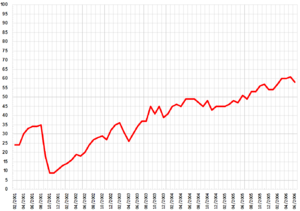I got just that question from someone the other day, and it made me realize what a lousy job we marketing “gurus” are doing in explaining what is important to people. I wonder if we have so emphasized the tools of the trade that we have forgotten what we are actually making with those tools. So, if you already know the answer to this question, then you can skip today’s post. For the rest of you, read on—I hope that you’ll soon understand what we marketing “experts” have failed to get across so far.
Image via Wikipedia
So, anyway, here is Steven’s full question, followed by my answer:
“I was wondering if organic and paid search efforts can actually hurt conversion rates. My logic is this: Before you undertake PPC advertising or organic SEO, some customers found you on the web anyway. Perhaps they were extremely motivated to find you and had a higher propensity to become customers than the visitors you could attract through advertising or higher organic rankings. I understand that your overall sales would still be higher, and efforts would still provide attractive ROI. I was just wondering if you’ve seen it happen. My logic is that while I would still convert the original visitors, visitors that find me now, who didn’t find me before, might convert at a lower rate than the original group…if that were the case, # conversions would definitely go up, but rate of conversion may drop. Is that possible?”
That’s certainly possible, Steven, but I am not sure why you would care.
Which business would you want? The one that gets one visitor each month who converts, or the one that gets 100 visitors each month where 20 convert? It’s a 100% conversion rate versus a 20% conversion rate, but I know which one I would rather own.
Conversion rate is only a tool. It can be helpful to calculate to project future sales based on visitor increases and it can be useful to get a handle on how persuasive your site is, but your goal isn’t higher conversion rate–it’s higher conversions.
If you can dramatically increase your visitors even though these new visitors have a lower conversion rate, you usually are still better off as long as it didn’t cost you much to attract them.
Also, search attracts people who buy later, so you can’t assume that the same people would discover your site in other ways. In other words, don’t worry about your conversion rate, except as a way to judge how persuasive your site is. It’s not an end in itself. What you are looking for are higher sales. And it stands to reason that by casting a wider net, you might lower your conversion rate, but isn’t that OK?





